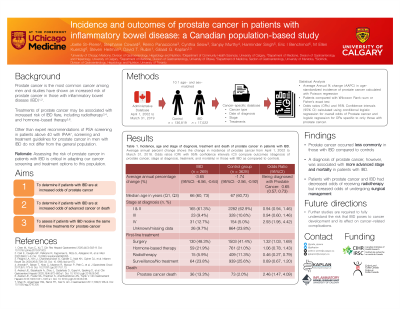Tuesday Poster Session
Category: IBD
P3550 - Incidence and Outcomes of Prostate Cancer in Patients With Inflammatory Bowel Disease: A Canadian Population-Based Study
Tuesday, October 24, 2023
10:30 AM - 4:00 PM PT
Location: Exhibit Hall

Has Audio

Joelle St-Pierre, MD, PhD
University of Calgary
Calgary, AB, Canada
Presenting Author(s)
Joelle St-Pierre, MD, PhD1, Stephanie Coward, PhD1, Remo Panaccione, MD1, Cynthia Seow, MD1, Sanjay Murthy, MD2, Harminder Singh, MD3, Eric Benchimol, MD, PhD4, Ellen Kuenzig, PhD5, Steven Heitman, MD, MSc1, David T. Rubin, MD6, Gilaad G. Kaplan, MD, MPH1
1University of Calgary, Calgary, AB, Canada; 2University of Ottawa, Ottawa, ON, Canada; 3University of Manitoba, Winnipeg, MB, Canada; 4University of Toronto, Toronto, ON, Canada; 5SickKids Inflammatory Bowel Disease Centre, University of Toronto, Toronto, ON, Canada; 6Inflammatory Bowel Disease Center, University of Chicago Medicine, Chicago, IL
Introduction: Prostate cancer is the most common cancer among men, and recent studies have shown an increased risk of prostate cancer in those with inflammatory bowel disease (IBD). Yet, other than expert recommendations for PSA screening in patients above 40 with ileal-pouch anastomoses, the screening and treatment guidelines for prostate cancer in men with IBD do not differ from the general population. The goals of our study were to assess if patients with IBD are: 1) at increased odds of prostate cancer; 2) at increased odds of advanced cancer and death, and, 3) receiving different first-line treatments for prostate cancer.
Methods: We conducted a population-based matched cohort study using a Canadian population-based administrative database from April 2002 to March 2018 to identify patients with IBD (n = 17,022), and age- and sex-matched 10-to-1 to healthy controls (n = 136,819). Specific data was then obtained from a cancer-specific database. Average annual percentage change (AAPC) in age standardized incidence of prostate cancer was calculated using Poisson regression. Comparisons were done using either Wilcoxon Rank-sum or Fisher’s exact tests. Odds ratios (ORs) and their 95% confidence intervals (95%CI) were calculated using conditional logistic regression for the overall odds of prostate cancer diagnosis and logistic regression for ORs specific to only those with prostate cancer.
Results: Of the patients included, 1.58% of patients with IBD were diagnosed with prostate cancer, in comparison to 2.65% in the control group [OR 0.65, (95%CI 0.57, 0.73)]. From 2002 to 2018 the incidence of prostate cancer decreased in those with IBD (AAPC=-3.65%; 95%CI -6.56, -0.64) and in the control group (AAPC=-1.74%; 95%CI: -2.56, -0.92). The median age of diagnosis of prostate cancer was similar between the two groups (p = 0.83). Among patients with prostate cancer, those with IBD had an increased odds of having stage IV prostate cancer (OR 2.94 [95%CI: 1.95, 4.42]), as well as having surgery as their first line of treatment (OR 1.3 [95%CI: 1.03, 1.69]). The odds of death from prostate cancer were increased among patients with IBD (OR 2.46 [95%CI: 1.47, 4.09]).
Discussion: While prostate cancer was less common in those with IBD compared to controls, a diagnosis of prostate cancer is associated with more advanced stage and mortality in these patients. Further studies assessing the risk of prostate cancer in patients with IBD are critical in adapting our cancer screening and treatment options to this population.
Disclosures:
Joelle St-Pierre, MD, PhD1, Stephanie Coward, PhD1, Remo Panaccione, MD1, Cynthia Seow, MD1, Sanjay Murthy, MD2, Harminder Singh, MD3, Eric Benchimol, MD, PhD4, Ellen Kuenzig, PhD5, Steven Heitman, MD, MSc1, David T. Rubin, MD6, Gilaad G. Kaplan, MD, MPH1. P3550 - Incidence and Outcomes of Prostate Cancer in Patients With Inflammatory Bowel Disease: A Canadian Population-Based Study, ACG 2023 Annual Scientific Meeting Abstracts. Vancouver, BC, Canada: American College of Gastroenterology.
1University of Calgary, Calgary, AB, Canada; 2University of Ottawa, Ottawa, ON, Canada; 3University of Manitoba, Winnipeg, MB, Canada; 4University of Toronto, Toronto, ON, Canada; 5SickKids Inflammatory Bowel Disease Centre, University of Toronto, Toronto, ON, Canada; 6Inflammatory Bowel Disease Center, University of Chicago Medicine, Chicago, IL
Introduction: Prostate cancer is the most common cancer among men, and recent studies have shown an increased risk of prostate cancer in those with inflammatory bowel disease (IBD). Yet, other than expert recommendations for PSA screening in patients above 40 with ileal-pouch anastomoses, the screening and treatment guidelines for prostate cancer in men with IBD do not differ from the general population. The goals of our study were to assess if patients with IBD are: 1) at increased odds of prostate cancer; 2) at increased odds of advanced cancer and death, and, 3) receiving different first-line treatments for prostate cancer.
Methods: We conducted a population-based matched cohort study using a Canadian population-based administrative database from April 2002 to March 2018 to identify patients with IBD (n = 17,022), and age- and sex-matched 10-to-1 to healthy controls (n = 136,819). Specific data was then obtained from a cancer-specific database. Average annual percentage change (AAPC) in age standardized incidence of prostate cancer was calculated using Poisson regression. Comparisons were done using either Wilcoxon Rank-sum or Fisher’s exact tests. Odds ratios (ORs) and their 95% confidence intervals (95%CI) were calculated using conditional logistic regression for the overall odds of prostate cancer diagnosis and logistic regression for ORs specific to only those with prostate cancer.
Results: Of the patients included, 1.58% of patients with IBD were diagnosed with prostate cancer, in comparison to 2.65% in the control group [OR 0.65, (95%CI 0.57, 0.73)]. From 2002 to 2018 the incidence of prostate cancer decreased in those with IBD (AAPC=-3.65%; 95%CI -6.56, -0.64) and in the control group (AAPC=-1.74%; 95%CI: -2.56, -0.92). The median age of diagnosis of prostate cancer was similar between the two groups (p = 0.83). Among patients with prostate cancer, those with IBD had an increased odds of having stage IV prostate cancer (OR 2.94 [95%CI: 1.95, 4.42]), as well as having surgery as their first line of treatment (OR 1.3 [95%CI: 1.03, 1.69]). The odds of death from prostate cancer were increased among patients with IBD (OR 2.46 [95%CI: 1.47, 4.09]).
Discussion: While prostate cancer was less common in those with IBD compared to controls, a diagnosis of prostate cancer is associated with more advanced stage and mortality in these patients. Further studies assessing the risk of prostate cancer in patients with IBD are critical in adapting our cancer screening and treatment options to this population.
Disclosures:
Joelle St-Pierre indicated no relevant financial relationships.
Stephanie Coward indicated no relevant financial relationships.
Remo Panaccione: Abbivax – Consultant. Abbott – Consultant. AbbVie – Consultant. Alimentiv – Consultant. Amgen – Consultant. Arena – Consultant. AstraZeneca – Consultant. Biogen – Consultant. Boehringer Ingelheim – Consultant. Bristol Myers Squibb – Consultant. Celgene – Consultant. Celltrion – Consultant. Cosmos Technology – Consultant. Eisai – Consultant. Elan – Consultant. Eli Lilly – Consultant. Ferring – Consultant. Fresenius Kabi – Consultant. Galapagos – Consultant. Genentech – Consultant. Gilead Sciences – Consultant. GlaxoSmithKline – Consultant. JAMP Bio – Consultant. Janssen – Consultant. Merck – Consultant. Mylan – Consultant. Novartis – Consultant. Oppilan Pharma – Consultant. Organon – Consultant. Pandion Pharma – Consultant. Pendopharm – Consultant. Pfizer Inc – Consultant. Progenity – Consultant. Prometheus – Consultant. Protagonist Therapeutics – Consultant. Roche – Consultant. Sandoz – Consultant. Satisfai Health – Consultant. Shire – Consultant. Sublimity Therapeutics – Consultant. Takeda Pharmaceuticals – Consultant. Theravance Biopharma – Consultant. Trellus – Consultant. UCB – Consultant. Ventyx – Consultant. Viatris – Consultant.
Cynthia Seow: Abbvie – Advisor or Review Panel Member, Consultant. Bristol Myers Squibb – Advisor or Review Panel Member, Consultant. Fresenius Kabi – Advisor or Review Panel Member, Consultant. Janssen – Advisor or Review Panel Member, Advisory Committee/Board Member, Consultant. Pfizer – Advisor or Review Panel Member, Consultant. Takeda – Advisor or Review Panel Member, Consultant.
Sanjay Murthy indicated no relevant financial relationships.
Harminder Singh indicated no relevant financial relationships.
Eric Benchimol indicated no relevant financial relationships.
Ellen Kuenzig indicated no relevant financial relationships.
Steven Heitman indicated no relevant financial relationships.
David Rubin: AbbVie – Consultant, personal fees. AltruBio – Consultant, personal fees. Aslan Pharmaceuticals – Consultant. Athos Therapeutics – Consultant. Bellatrix Pharmaceuticals – Consultant. Boehringer Ingelheim – Consultant, personal fees. Bristol Myers Squibb – Consultant. Celgene Chronicles – Consultant. ClostraBio – Consultant. Connect BioPharma – Consultant. Corp/Syneos – Consultant. Eco R1 – Consultant. GastroIntestinal Research Foundation – Grant/Research Support. Genentech/Roche – Consultant. Gilead Sciences – Consultant, personal fees. Helmsley Charitable Trust – Grant/Research Support. Iterative Health – Consultant. Janssen Pharmaceuticals – Consultant, personal fees. Kaleido Biosciences – Consultant. Lilly – Consultant. Pfizer – Consultant, personal fees. Prometheus Biosciences – Consultant. Reistone Biopharma – Consultant, personal fees. Seres Therapeutics – Consultant. Takeda – Consultant, Grant/Research Support, Personal fees. Target RWE – Consultant. Trellus Health – Consultant.
Gilaad Kaplan: AbbVie (received honoraria) – Consultant, Speaking. Amgen (received honoraria) – Consultant, Speaking. Ferring – Grants for research support. Janssen (received honoraria) – Consultant, Speaking. Pendophram (received honoraria) – Consultant, Speaking. Pfizer (received honoraria) – Consultant, Speaking. Sandoz (received honoraria) – Consultant, Speaking. Takeda (received honoraria) – Consultant, Speaking. TREATMENT OF INFLAMMATORY DISORDERS, AUTOIMMUNE DISEASE, AND PBC. UTI Limited Partnership, assignee. Patent WO2019046959A1. PCT/CA2018/051098. 7 Sept. – Intellectual Property/Patents.
Joelle St-Pierre, MD, PhD1, Stephanie Coward, PhD1, Remo Panaccione, MD1, Cynthia Seow, MD1, Sanjay Murthy, MD2, Harminder Singh, MD3, Eric Benchimol, MD, PhD4, Ellen Kuenzig, PhD5, Steven Heitman, MD, MSc1, David T. Rubin, MD6, Gilaad G. Kaplan, MD, MPH1. P3550 - Incidence and Outcomes of Prostate Cancer in Patients With Inflammatory Bowel Disease: A Canadian Population-Based Study, ACG 2023 Annual Scientific Meeting Abstracts. Vancouver, BC, Canada: American College of Gastroenterology.

